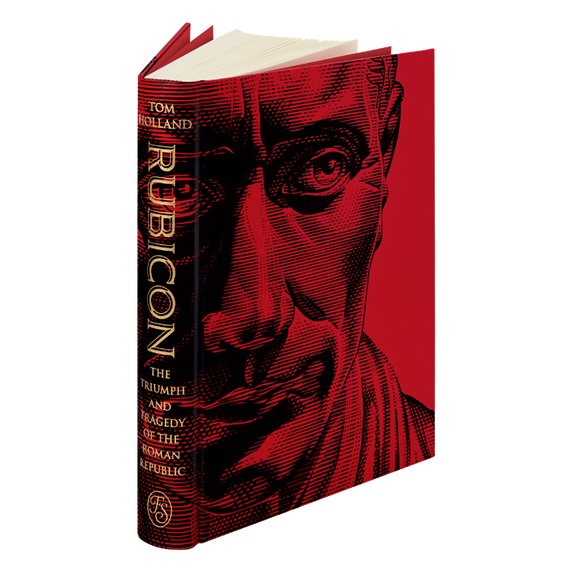
Rubicon
A gripping account of the twilight of the Roman Republic and its bloody transformation into empire, Tom Holland’s Rubicon is reimagined as a stunning Folio edition.
Illustrated by Nick Hayes
Introduced by Katherine Harloe
Translated by Martin Hammond
Limited to 750 hand-numbered copies
Over Two-Thirds Sold
Folio’s fabulous limited edition of the first great military history has been expertly handbound in full-grain leather. Featuring illustrations by Nick Hayes and an exclusive introduction by Katherine Harloe, each of the 750 numbered copies has been signed by both contributors.
‘In this age of populist politics, plague and war, The Peloponnesian War still offers much material for reflection.’
- Katherine Harloe, from her introduction
In documenting the Peloponnesian war, the defeat of the democracy of Athens by the oligarchy of Sparta in the 5th century BC, Thucydides invented a completely new approach to reporting events. Assigning nothing to the will of the gods, his history was instead impartial, evidence-based and informed by his understanding of human nature. His work has shaped attitudes towards military intervention for 2,400 years and continues to offer profound insights into the challenges facing humanity today.
Bound in sumptuous leather by Smith Settle in Yorkshire, Martin Hammond’s outstanding translation is complemented with stunning illustrations by Nick Hayes and a specially commissioned introduction from classical historian Katherine Harloe. With two-colour printing, gilded page-tops, and an elegant limitation page signed by both the illustrator and the introducer, this Folio limited edition is truly exceptional.
Bound in full-grain leather blocked in black and gold foils with a design by Nick Hayes
Signed by Nick Hayes and Katherine Harloe
Nine two-colour illustrations and page decorations by Nick Hayes
Five maps
744 pages set in Haarlemmer
Printed in two colours on Abbey Pure paper
Freelife Merida endpapers printed in gold with a design by Nick Hayes
Gilded page-tops
Black grosgrain ribbon marker
11½" x 8"
Additional introduction and notes by P. J. Rhodes
Blocked, cloth-covered slipcase lined with printed paper
‘It happened then and will forever continue to happen, as long as human nature remains the same.’
- Thucydides
Throughout his extraordinary narrative, Thucydides draws together ideas about the risks of empire-building, the inevitable clashes between different cultures and the weaknesses of all systems of government at times of crisis that resonate powerfully through the ages. Stark narrative passages recount the horrors of a crippling plague and the brutal reality of a failed overseas invasion. Political set-pieces reveal the dangerous mismatch between the arguments of restrained leaders and the emotive speeches of firebrand politicians. Explanations of military tactics, the difficulties of combat in rugged terrain and the progress of the war’s one great night battle are given in fascinating detail. And through it all Thucydides describes what he believes to be the true tendencies of human nature – fear, ambition and the desire to rule.
Born into an aristocratic Athenian family, Thucydides started work on his masterpiece immediately after war broke out in 431 BC, realising that this was the ‘greatest disturbance’ ever to have affected the Greek world. He served as a general but was exiled for 20 years after arriving too late to prevent the capture of the Athenian colony at Amphipolis. He used the ‘relative calm’ of his banishment productively, pursuing his research with remarkable rigour, and supplementing his own experience with an understanding of the Spartan point of view. The result is a landmark in the writing of human history – a pioneering blend of accuracy and balance, intelligence and humanity – which led T. B. Macaulay to declare Thucydides ‘the greatest historian that ever lived’.
Each of the eight ‘books’ that make up The Peloponnesian War opens with a powerful double-page illustration by Nick Hayes. Created using modern digital technology, these eye-catching images simultaneously evoke the muscular red and black figures and intricate geometric designs of ancient Greek pottery, recall the British linocut tradition embodied by Edward Bawden, and reflect Hayes' own love of landscape and the natural world.
Professor Katherine Harloe, Director of the Institute of Classical Studies at the University of London, has contributed a specially commissioned introduction. Drawing on her expertise in the enduring influence of classical antiquity, Professor Harloe highlights the uncanny contemporary relevance of Thucydides’ ancient narrative – with its descriptions of superpowers embarking on ill-fated invasions, the rise of unscrupulous populist politicians who threaten the very roots of democracy, an alarming wave of environmental disasters, and the devastating effects of a deadly plague.
Thucydides’ original Greek text is notoriously difficult, but Martin Hammond’s masterly 2009 translation captures his distinctive authorial voice in lucid, modern prose. This definitive account is supplemented by P. J. Rhodes’ original introduction, along with a judicious selection from his accompanying notes, and is further enhanced by five hand-drawn maps of key areas, printed in two colours for additional clarity.




